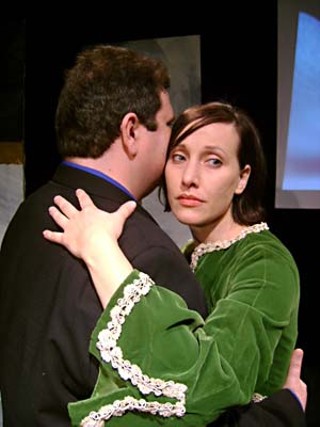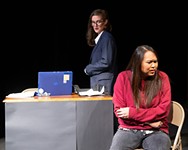The Heidi Chronicles
What makes Wendy Wasserstein's play still relevant ekes through at City Theatre
Reviewed by Elizabeth Cobbe, Fri., April 3, 2009

The Heidi Chronicles
City Theatre, through April 19
Running time: 2 hr, 30 min
The Heidi Chronicles is a play that dares to say some things about being a woman. Wendy Wasserstein wrote the play at a time when feminism was transitioning from a focus on liberation and equality to a focus on freedom and choice. This was when women began to notice that even if they shed blood, sweat, and tears for a career, certain dilemmas didn't go away – namely, how to balance the part of themselves that was active in the world, outside the home, with the expectations placed on the part that was not.
It's perhaps this specific feeling of unease that so many women continue to feel that keeps The Heidi Chronicles relevant. Heidi Holland (Rachel McGinnis) is a smart, direct woman who grows from awkward adolescent to confident professor of art history who speaks to us about the lives of women artists and the challenges they face. Each scene chronicles a time in history and a time in Heidi's life. In fact, she is not unlike a chronicler herself: someone who doesn't participate fully, who keeps one foot in objectivity. This is both her downfall and her grace.
Wasserstein's gift lies in the fact that Heidi appears isolated and lonely at times, and yet thousands upon thousands of women (and men, too) through the years have related to her intimately. This is the kind of play that suggests a place to put your feet when you feel pushed and pulled by trends and movements without believing in any of them, really.
Many of The Heidi Chronicles' supporting characters are equally complex. Long before Sex and the City's Mr. Big ever led Carrie on, Wasserstein gave us Heidi's Scoop (the talented Charles P. Stites), the man who disappoints her, loves her, runs away, and always comes back again. Heidi's wisecracking but compassionate gay semi-soul-mate, Peter (Gabriel Smith), reminds us that women aren't the only ones who have been fighting for recognition of their social worth.
The great challenge of this play, however, is that the many bit characters who mark each era for Heidi can easily turn into two-dimensional caricatures. Even Heidi's companion Susan (Christa Haxthausen) is hard to nail down as she willingly follows every trend that comes along, from sock-hopping to bra-burning to power-broking in Hollywood. What often gets lost in production is that these people wholly believe in who and where they are at that time, and unfortunately the staging by City Theatre, under Susie Gidseg's direction, is no exception. Fran, the militant-feminist lesbian (Katie Christman), may dress in camos, but she has a heartfelt reason for it. Susan may shift with every prevailing cultural wind, but that is as much a survival strategy as Heidi's resistance to that which does not seem genuine.
As Heidi, McGinnis' work is best in her monologues to the audience, when we can see that she never succumbs to bitterness. In many of her dialogues, she falls back on a nervous smile and laugh, which seems the opposite of Heidi Holland, who never quite has access to the same coyness as other women.
I saw this production on a rushed opening night after City had closed Fences less than a week before, and perhaps for that reason, scene changes appeared sloppy. A few set pieces didn't work, and certain props didn't get into place when they were supposed to. Overall, what is great about The Heidi Chronicles still eked through, and with more performances, this production may discover where it can really shine.










